Seventy five years ago, halfway across the world, in San Francisco, California, in the United States, representatives of 50 nations gathered solemnly in a historic event culminating from the years of war, volatile peace, and grief at the tremendous loss of millions of lives. Embarking on yet another impossible dream, but holding onto hope that humanity’s shared experience of strife and destruction would reap a shared vision of lasting peace—these representatives stood, at noontime in the United States, at approximately 3:00 am in Philippine local time, just as the Philippine sun was about to rise.
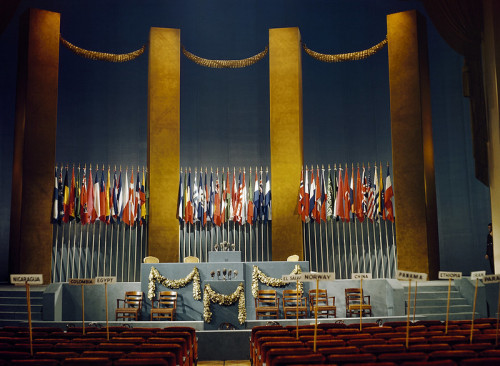
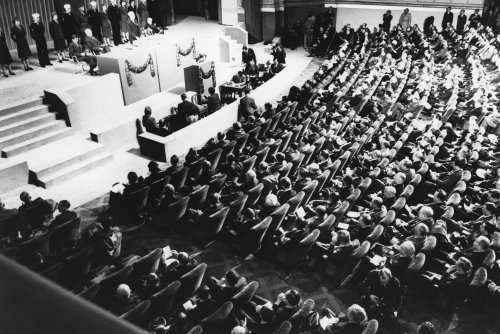
*Photos of the United Nations Conference on International Organization (25 April-26 June 1945). From the United Nations Organization.
At the time, across the world, the Axis Powers, led by Nazi Germany, have been defeated in Europe. As smoke cleared, to the shock of the entire world, Nazi gas chambers were uncovered, and the bones and ashes of around 6 million gassed Jewish lives were found. The Holocaust, long having been denied by much of the West, including the United States, have been confirmed.
In the Pacific, the Philippines and the rest of Southeast Asia have been pushing back against the fascist Imperial Japanese forces, then on the retreat. Amidst the total destruction of the Philippine capital, (Manila was next only to the city of Warsaw as the most destroyed Allied capital of World War II), Filipinos, as well as their kindred Asian peoples who suffered under the Japanese, have begun picking up the pieces for rebuilding their nations anew, as the colonial apparatus in Asia have been shaken. The Allied forces have embarked on a push towards the final landing on Japan itself, as millions of Japanese civilians succumb to famine, carpet bombings, and a torn military leadership who still fanatically refused to surrender.
The ambitious project that would be the United Nations was long in coming. At the cessation of hostilities in the First World War, an organization of nations called the League of Nations tried to restore order, set rules for humane engagement in war, and tried to broker piece in continental Europe and w/ rising powers in the East such as Russia and Japan. But the seeds of inequality in treaties overseen by the League, and an apparent misrepresentation and unfairness it unintentionally imparted, as well as self-interest among its members, led to its disintegration and the outbreak of the Second World War. At the time, the Philippines was yet to achieve its independence from the United States.
The Japanese-occupied Philippines had been amply represented by the late President Manuel L. Quezon, who led the Philippine Commonwealth government-in-exile in Washington, D.C., when the talks of organizing a “United Nations” began in 1942, even as his health deteriorated.
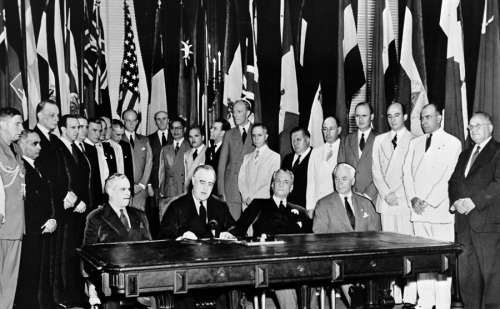
*President Manuel L. Quezon, sitting with world leaders (3rd from the left), circa 1942. The Philippines signed the UN Declaration on 10 June 1942. From the United Nations Organization website.
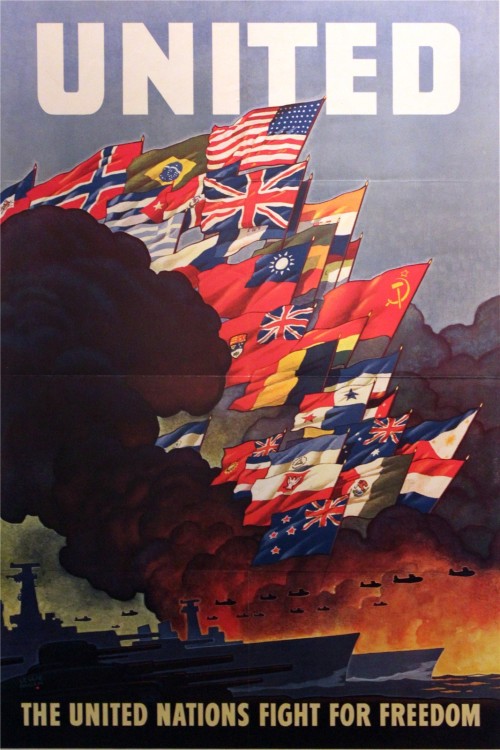
*A 1943 propaganda poster of the Allied forces, with the Philippine flag included (at the far right). Courtesy of the Peace Palace Library.
With the Leyte Landings, the restoration of the government on Philippine soil, and the subsequent reclaiming of Malacañan Palace in February 1945, the new President, Sergio Osmeña, gladly accepted the invitation of the Allied Powers, the Big Four—namely the United States of America, United Kingdom of Great Britain, the United Soviet Socialist Republics, and the Republic of China—for the Philippines to attend a historic event, the signing of the Charter of the United Nations.
Osmeña sent Carlos P. Romulo, Resident Commissioner of the Philippines to the United States, and 7 others representing the Senate, Congress, the Philippine defense forces, and the academe, to attend the United Nations Conference on International Organization, or what would be known in history as the San Francisco Conference. Beginning from 25 April to 26 June 1945 (around 62 days), the Philippine delegation, together with the other 49 nations, with their 850 delegates and 3,500 secretariat personnel, have struggled to reach a consensus of this new world order of peace.
Painstakingly debated, each line and wording were carefully crafted, that now compose the historic United Nations Charter:
We the Peoples of the United Nations determined,
To save succeeding generations from the scourge of war, which twice in our lifetime has brought untold sorrow to mankind, and to reaffirm faith in fundamental human rights, in the dignity and worth of the human person, in the equal rights of men and women and of nations large and small, and to establish conditions under which justice and respect for the obligations arising from treaties and other sources of international law can be maintained, and to promote social progress and better standards of life in larger freedom,
And for these ends,
To practice tolerance and live together in peace with one another as good neighbours, and to unite our strength to maintain international peace and security, and to ensure, by the acceptance of principles and the institution of methods, that armed force shall not be used, save in the common interest, and to employ international machinery for the promotion of the economic and social advancement of peoples,
Have resolved to combine our efforts to accomplish these aims.
Accordingly, our respective Governments, through representatives assembled in the city of San Francisco, who have exhibited their full powers found to be in good and due form, have agreed to present CHARTER OF THE UNITED NATIONS and do hereby establish an international organization known as the UNITED NATIONS.
On this day, seventy five years ago, at the War Veterans Memorial Building in San Francisco, each delegation stood up, with the Republic of China having the honor of being the first, for having been the first victim of the Axis Powers with the Japanese encroachment on the Chinese mainland and their horrifying experience in the Rape of Nanjing. On a round table, lit up brightly by spotlights, surrounded circularly by 50 flags of these nations, laid two documents to be signed—the Charter of the United Nations, and the Statute of the International Court of Justice. Poland, at the time, having suffered the worst in Europe, have yet to form a government to represent them, but a space was left for their signature on the documents, for having contributed so much to the Allied victory in Europe.
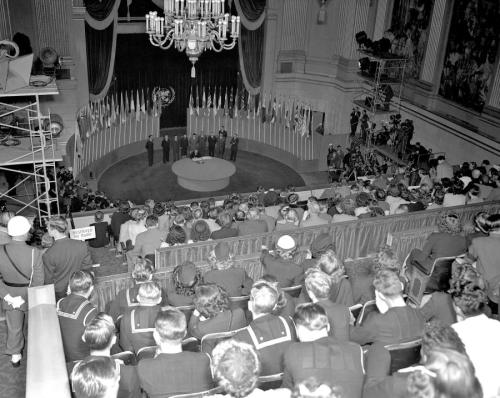
*The United Nations Charter is signed by each delegation of the 50 nations that declared war against Germany and Japan, and/or signed the UN Declaration in 1942. Photo courtesy of the United Nations Organization.
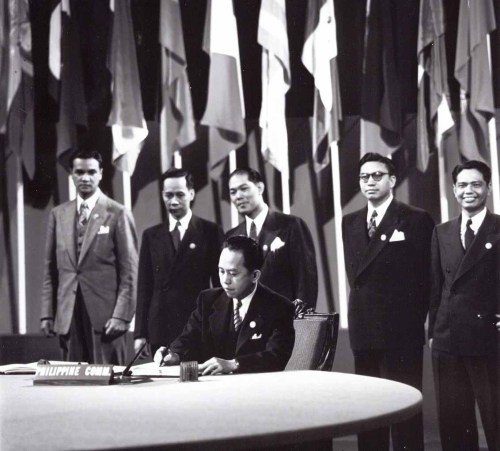
*On 27 June 1945 (dawn, Philippine time/ 26 July in San Francisco U.S.A.), Carlos P. Romulo, as Resident Commission of the Commonwealth of the Philippines to the United States, signs the UN Charter.
The Philippines, upon the signing of the documents, is one of the 50 core members of the United Nations, despite not having yet full sovereignty and independence at the time. The Philippines was also one of the only 4 Asian countries to sign these documents. Given our proven commitment on human rights from the time President Manuel Quezon opened the doors of the Philippines to the Jewish refugees when most of the world powers were closing their doors on them, the Philippines had proven itself worthy of becoming a responsible player in the geopolitical balance in the Pacific. The signatory on the nation’s behalf, Carlos P. Romulo, would soon serve as the Chairman of the United Nations Security Council from 1949 to 1950, the first Asian leader to assume the position.
The United Nations would not yet exist, as these representatives would go back to their respective countries for their legislatures to ratify the Charter. On 24 October 1945, the ratification of these member states were all in, and as such, the United Nations was established on that day.
But beyond the rhetorics and the painstaking effort to talk amidst ethnic, linguistic, social, political, and religious barriers, the miracle of this date should never be taken for granted. For upon the establishment of the United Nations was a lasting world order of peace that the world had not yet seen.
It is this same international order that is now being threatened by demagogues in different parts of the world today. This order built an environment across the world, imperfect though it might be, conducive for international cooperation in the sciences and humanities, in the expansion of human knowledge (especially now that scientists all over the world are researching on finding a cure in this COVID-19 pandemic), innovation, and even in the peaceful arbitration between opposing modern states. This peace remains fragile and must be preserved.
Today, there are many challenges that the Philippines faces. Despite the country’s historic victory in the Permanent Court of Arbitration in 2016, the current government has failed to follow through with using this victory and the force of our influence in the U.N. as leverage in the growing encroachment of China in the West Philippine Sea. It was only recently that our own foreign affairs department had been vocal. Moreover, the country’s commitment to the universal ideals such as human rights have largely been diminished, thanks to the concerning policies of the current government, which have also knowingly lambasted the U.N. This is utterly unfortunate, for those who came before us have laid for us a track record that many nations look up to.
May the Filipino people never forget, and continue to hold fast to this heritage—the ideals of freedom, human dignity, and human rights—universal ideals we share with the rest of the freedom-loving peoples of the world.
49 Notes/ Hide
yasu-gyaru reblogged this from indiohistorian
yasu-gyaru liked this
 marieellene liked this
marieellene liked this  parchedment liked this
parchedment liked this devkyu liked this
badmoodbird reblogged this from ajora
meimikana liked this
rabbittrabbitt liked this
epilogoest reblogged this from camalyng
breadedsinner liked this
camalyng reblogged this from indiohistorian
 eurydiceyy liked this
eurydiceyy liked this lookingupanddown reblogged this from indiohistorian
 womanlalaboy liked this
womanlalaboy liked this  tiredfil-am reblogged this from indiohistorian
tiredfil-am reblogged this from indiohistorian  89dpt reblogged this from indiohistorian
89dpt reblogged this from indiohistorian  89dpt liked this
89dpt liked this brenli reblogged this from indiohistorian
brenli liked this
ahaaas reblogged this from indiohistorian
ahaaas liked this
worclip liked this
 krisjcarreon reblogged this from indiohistorian and added:
krisjcarreon reblogged this from indiohistorian and added: just imagine what the world would be like if the league of nations was never formed even if it was unsuccessful. Winston...
saikatlo liked this
 banananinana liked this
banananinana liked this  nablah liked this
nablah liked this adisasterchild liked this
getas-regina reblogged this from indiohistorian
getas-regina liked this








